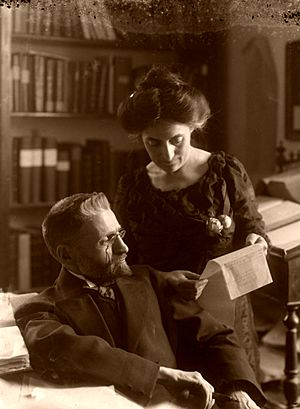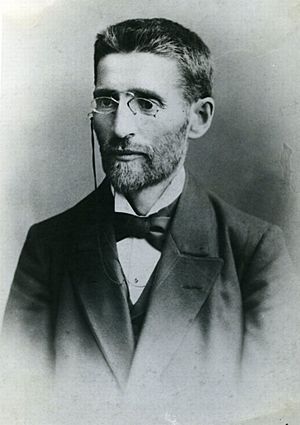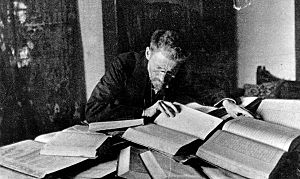Eliezer Ben-Yehuda facts for kids
Quick facts for kids
Eliezer Ben-Yehuda
|
|
|---|---|
| אליעזר בן־יהודה | |
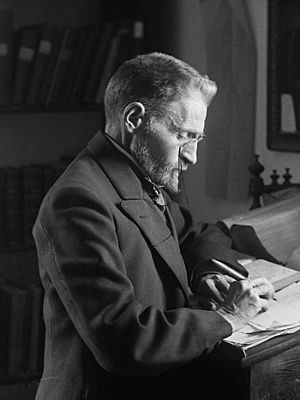
Ben-Yehuda at work
|
|
| Born |
Eliezer Yitzhak Perlman
7 January 1858 Luzhki, Vilna Governorate, Russian Empire
|
| Died | 16 December 1922 (aged 64) |
| Occupation | Lexicographer |
| Known for | Revival of the Hebrew language |
| Spouse(s) |
|
| Children |
|
Eliezer Ben‑Yehuda (born Eliezer Yitzhak Perlman, 7 January 1858 – 16 December 1922) was a very important person in the story of the Hebrew language. He was a dictionary maker and a newspaper editor. Ben-Yehuda is famous for bringing the Hebrew language back to life for everyday use in modern times.
Contents
Biography
Eliezer Yitzhak Perlman was born in 1858 in a place called Luzhki. This area was part of the Russian Empire, which is now Belarus. His parents were Yehuda Leib and Tzipora Perlman.
From the age of three, Eliezer went to a Jewish elementary school called a "cheder". There, he learned Hebrew and studied the Bible. This was a common practice for Jewish children in Eastern Europe. By the time he was twelve, he had read many parts of the Torah, Mishna, and Talmud.
His mother and uncle hoped he would become a rabbi, a Jewish religious leader. So, they sent him to a yeshiva, which is a Jewish religious school. At the yeshiva, he discovered a new kind of Hebrew. This was the Hebrew used in the "Haskalah" or Jewish enlightenment, which included non-religious writings.
Later, he learned French, German, and Russian. He was sent to another city for more education. While reading a Hebrew newspaper called HaShahar, he learned about an early movement called Zionism. This movement believed in creating a Jewish homeland in the Land of Israel. Eliezer thought that if Hebrew became the main language again in Israel, it could unite all Jews around the world.
After finishing his studies in 1877, Ben-Yehuda moved to Paris. He stayed there for four years. He studied many subjects at the Sorbonne University, including the history and politics of the Middle East. In Paris, he met a Jewish person from Jerusalem who spoke Hebrew with him. This conversation made him believe that Hebrew could truly become the language of a nation.
In 1881, Ben-Yehuda moved to Palestine, which was then ruled by the Ottoman Empire. He settled in Jerusalem. He found a job teaching at the Alliance Israelite Universelle school. Ben-Yehuda wanted to create a new language for Jews who were moving to Israel from different parts of the world. He believed this new language could replace Yiddish and other local languages they spoke.
He saw Hebrew and Zionism as very connected. He wrote, "The Hebrew language can live only if we bring the nation back to its homeland."
To help make Hebrew a modern language, Ben-Yehuda worked with the Committee of the Hebrew Language. He insisted that to fill in missing words, the Committee should create new words. They would do this by using grammar rules and looking at old Semitic languages like Aramaic and Arabic.
Ben-Yehuda was married twice, to two sisters. His first wife, Devora, passed away in 1891 from tuberculosis. She left behind five young children. Her last wish was for Eliezer to marry her younger sister, Paula Beila. Soon after Devora's death, three of his children died from a disease called diphtheria within just ten days. Six months later, he married Paula, who took the Hebrew name "Hemda." Hemda Ben-Yehuda became a talented writer and journalist. She made sure the Hebrew dictionary was finished after Eliezer's death. She also helped raise money and organize scholars to work on the dictionary.
In 1903, Ben-Yehuda supported Theodor Herzl's idea for a Jewish homeland in Uganda. Many others who moved to Israel around that time also supported this idea.
Ben‑Yehuda raised his son, Ben-Zion Ben-Yehuda, to speak only Hebrew. Ben-Zion was the first person to speak modern Hebrew as his first language. Ben-Yehuda did not let his son hear other languages when he was a child. He even told his wife off for singing a Russian lullaby.
Opposition to Hebrew
Many religious Jews at the time did not like Ben-Yehuda's efforts to bring the Hebrew language back to life. They believed that Hebrew was a holy language, meant only for religious texts and prayers. They thought it should not be used for everyday talks or non-religious things. The idea of Hebrew becoming a modern language for Jews seemed strange to them.
In December 1893, Ben-Yehuda and his father-in-law were put in prison by the Ottoman authorities in Jerusalem. Some members of the Jewish community had accused them of causing trouble against the government.
Journalistic career
Ben-Yehuda was the editor of several newspapers written in Hebrew. These included HaZvi, Hashkafa, and HaOr. His newspaper HaZvi was shut down for a year. This happened because some very religious groups in Jerusalem strongly opposed using Hebrew, their holy language, for everyday conversations.
Lexicography and the Hebrew Dictionary
Ben-Yehuda played a huge role in starting the Committee of the Hebrew Language (Va'ad HaLashon). This group later became the Academy of the Hebrew Language, which still exists today. He wrote the first modern Hebrew dictionary. Because of his work, he became known as the "reviver" (המחיה) of the Hebrew language.
Even though some people disagreed with the new words he created, many of these words are now part of the language. However, some of his new words never became popular.
Ben-Yehuda and the Committee often looked to old languages like Aramaic and Arabic for new words. Ben-Yehuda believed that the roots of Arabic words were once part of Hebrew. He thought they had been "lost, and now we have found them again!"
Death and Commemoration
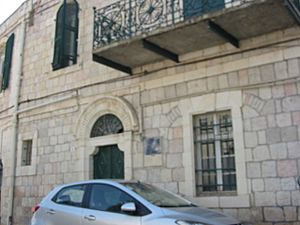
In December 1922, Ben-Yehuda passed away at the age of 64. He had suffered from tuberculosis for most of his life. He was buried on the Mount of Olives in Jerusalem. About 30,000 people attended his funeral.
Ben-Yehuda had built a house for his family in the Talpiot neighborhood of Jerusalem. Sadly, he died three months before it was finished. His wife Hemda lived there for almost thirty years. Ten years after her death, their son Ehud gave the house to the Jerusalem city government. The idea was to turn it into a museum and study center.
Today, the house is used as a conference center and guesthouse. A German organization called Action Reconciliation Service for Peace (ARSP) runs it. They organize workshops, seminars, and Hebrew language courses there.
Cecil Roth, a historian, summed up Ben-Yehuda's amazing work. He said, "Before Ben‑Yehuda, Jews could speak Hebrew; after him, they did." This means that before Ben-Yehuda, Hebrew was mostly used for religious study. But because of him, it became a living language spoken by millions of people every day. It is very rare for an ancient language to become a modern national language with so many native speakers.
See also
 In Spanish: Eliezer Ben Yehuda para niños
In Spanish: Eliezer Ben Yehuda para niños
 | Mary Eliza Mahoney |
 | Susie King Taylor |
 | Ida Gray |
 | Eliza Ann Grier |


